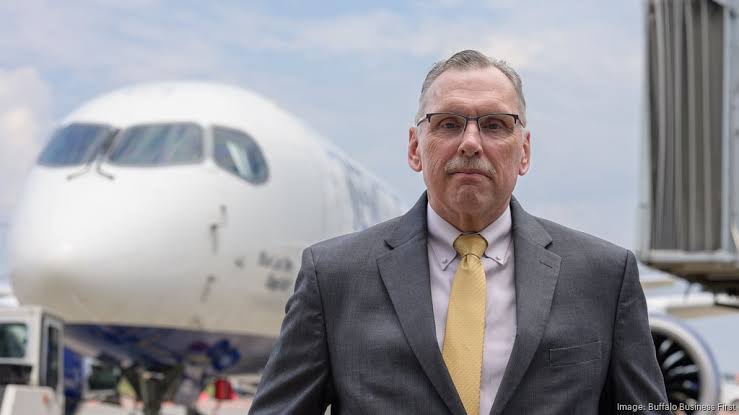Westjet Airlines CEO Suspended Due To An Outrageous Incident
WestJet CEO Suspended Following Accessibility Controversy: What Happened and What It Means for the Airline Industry
In a major turn of events, Alexis von Hoensbroech, the CEO of WestJet Airlines, has been suspended following a series of incidents regarding the airline’s failure to properly accommodate passengers with disabilities. This suspension has sparked widespread public outrage, leading to increased scrutiny from government bodies and advocacy groups. The incident in question highlights serious concerns about the airline’s approach to accessibility, an issue that has been increasingly under the spotlight in recent years.
The Triggering Incident: A Paralympian’s Humiliating Experience
The controversy began when former Paralympian Sarah Morris-Probert shared her deeply unsettling experience while traveling with WestJet. According to her account, she was forced to ascend the stairs of an aircraft unaided due to broken equipment meant to accommodate her mobility aids. Despite efforts from the airline crew, the lack of functional accessibility services left Morris-Probert in a humiliating and unsafe situation. Her story quickly gained traction online, drawing widespread condemnation from disability rights advocates, lawmakers, and the general public.
This incident is not an isolated case; passengers with disabilities have long reported substandard experiences while flying, ranging from the mishandling of mobility aids to poor communication and lack of proper assistance. Morris-Probert’s account brought these issues into sharp focus and sparked an outcry against the airline’s failure to uphold its responsibility to all passengers, regardless of their physical abilities.
CEO’s Apology and Subsequent Suspension
In the aftermath of the incident, CEO Alexis von Hoensbroech issued a public apology, acknowledging the airline’s failures in adequately accommodating passengers with disabilities. In his statement, von Hoensbroech emphasized that although most passengers with mobility issues had positive experiences with the airline, “every case that goes wrong is one too many.” The CEO promised to implement corrective measures, including forming a dedicated task force to review and improve accessibility procedures.
However, his apology did little to quell the growing criticism. Disability advocates and lawmakers quickly voiced their dissatisfaction with the airline’s lack of transparency and the apparent inadequacy of its response. The situation escalated further when von Hoensbroech was called to testify before a parliamentary committee, where he faced tough questions about the airline’s practices and the timeliness of its response. Amid mounting pressure, WestJet announced that the CEO would be suspended pending a thorough investigation into the airline’s accessibility policies and practices.
What This Means for the Airline Industry
This incident has cast a spotlight on the broader issue of accessibility in the airline industry. Despite improvements in some areas over the past decade, airlines as a whole have been criticized for neglecting the needs of passengers with disabilities. The suspension of such a high-profile figure as WestJet’s CEO sends a clear message that failure to provide adequate accessibility can no longer be overlooked or dismissed as a minor issue.
Advocacy groups have long called for more stringent regulations to ensure airlines meet accessibility standards, and this incident may be the catalyst for stronger industry-wide reforms. Airlines must be held accountable for ensuring that every passenger, regardless of their physical capabilities, has equal access to services and facilities. This will likely result in a push for more robust legislation and regulation to hold companies accountable for providing accessible travel options.
WestJet’s Response and Future Outlook
In response to the suspension, WestJet has vowed to make significant changes to its accessibility protocols. The airline announced plans to overhaul its staff training procedures, invest in the maintenance of accessible equipment, and improve communication with passengers requiring special assistance. These actions, while a step in the right direction, have been met with a cautious optimism from the public. Many feel that a genuine, long-term commitment to accessibility requires more than just superficial changes—it requires a cultural shift within the organization and industry as a whole.
While these steps are important, they are only the beginning. Disability advocates stress the need for continuous improvements and sustained efforts to create an inclusive travel experience. It is not enough to implement new policies or initiatives temporarily; the airline must prove its commitment through ongoing actions and regular assessments of its accessibility practices.
The suspension of WestJet’s CEO serves as a stark reminder that issues of accessibility in air travel are not to be taken lightly. It highlights the urgency for airlines to take full responsibility for ensuring that all passengers, regardless of their abilities, are provided with a safe and dignified experience. As the airline works to rectify its mistakes, the broader aviation industry must take note and consider how to address similar concerns within their own operations. The WestJet incident should mark a turning point, where accessibility is no longer an afterthought but a central tenet of customer service in the airline industry.
In the end, the true test of WestJet’s commitment to change will be in its actions, not just words. Only time will tell if the airline can rebuild trust with its customers and set a new standard for accessibility in air travel.






